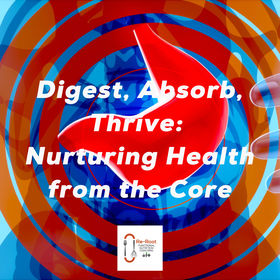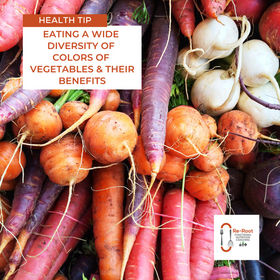
Cravings Got You Down? Mindful Eating Can Help You Reclaim Control
Does the pressure of daily life leave you reaching for sugary treats or mindlessly munching chips? We've all been there! Stress can wreak havoc on our eating habits, leading to choices that leave us feeling sluggish and unsatisfied.
But what if there was a way to manage stress and cultivate a healthier relationship with food? Enter mindful eating! This isn't a fad diet or a set of restrictive rules. Mindful eating is a journey of self-discovery that empowers you to approach food with awareness and present-moment focus.
Imagine: Savor each bite, appreciating the sights, smells, and textures of your food. Pay attention to how the food makes you feel – physically and emotionally. Mindful eating also involves tuning into your body's hunger and fullness cues. Are you truly hungry, or are you seeking comfort for emotional reasons?
By becoming more aware of these signals, you can learn to eat in a way that nourishes your body without overindulging. This mindful approach allows you to break free from autopilot mode and cultivate a more conscious relationship with food. Ultimately, it promotes a sense of well-being and reduces stress-related cravings.
Science Backs Up Mindful Eating:
A growing body of research supports the benefits of mindful eating practices. Studies have shown that mindful eating can lead to:
- Reduced Stress and Anxiety: By focusing on the present moment and the experience of eating, mindful eating can help take your mind off worries and anxieties.
- Improved Weight Management: Mindful eating encourages you to eat more slowly and savor your food, leading to a feeling of fullness with less food. This can contribute to weight loss or weight maintenance efforts.
- Enhanced Emotional Well-being: By tuning into your body's hunger cues and emotional state, mindful eating can help you identify and address emotional eating triggers.
- Increased Enjoyment of Food: When you slow down and pay attention to the sensory experience of eating, you can appreciate the taste, texture, and aroma of your food in a whole new way.
Why Does Stress Lead to Unhealthy Eating?
When we're stressed, our body goes into fight-or-flight mode. This ancient survival mechanism releases hormones like cortisol, which can increase our appetite and cravings for sugary, fatty foods. These foods provide a quick burst of energy, but leave us feeling sluggish and potentially contribute to weight gain in the long run.
Stress can also lead to emotional eating. We turn to food for comfort, to numb difficult emotions, or to simply distract ourselves from the overwhelm. This can create a vicious cycle of stress-induced overeating followed by guilt and shame.
Breaking Free with Mindful Eating:
Mindful eating isn't about deprivation or restriction. It's about becoming more aware of our relationship with food and learning to eat in a way that nourishes both our body and mind. Here are 10 tactics to get you started:
1. Practice Gratitude Before Each Meal: Appreciate the food on your plate – the farmers who grew it, the hands that prepared it, the very act of nourishment.
2. Create a Calming Eating Environment: Turn off distractions and find a quiet space to enjoy your meal. Focus on the experience of eating.
3. Eat Slowly and Savor Each Bite: Put down your fork between bites and chew thoroughly. This allows your body to register feelings of fullness and prevents overeating.
4. Tune into Your Body's Hunger Cues: Learn to distinguish between true hunger and emotional cravings.
5. Choose Nutrient-Dense Foods: Focus on whole, unprocessed foods that nourish your body and mind. Prioritize fruits, vegetables, whole grains, lean proteins, and healthy fats.
6. Listen to Your Body's Signals: Stop eating when you're comfortably satisfied, not stuffed.
7. Be Kind to Yourself: There will be slip-ups. Don't beat yourself up if you overindulge or reach for comfort food during a stressful time. Simply acknowledge it and get back on track with your next meal.
8. Develop Stress Management Techniques: Find healthy ways to manage stress, such as yoga, meditation, or spending time in nature.
9. Practice Self-Compassion: Stress is a normal part of life. Be kind to yourself as you learn to manage it in healthier ways.
10. Celebrate Your Progress: Acknowledge your successes, no matter how small. Every mindful meal is a step in the right direction.
Beyond the Plate: A Holistic Approach:
Mindful eating is just one piece of the puzzle. Stress management encompasses a holistic approach. Consider these tips:
- Regular Exercise: Physical activity is a powerful stress reliever. Find an activity you enjoy, whether it's a brisk walk, going to the gym, or a yoga session. Exercise releases endorphins, which have mood-boosting effects and can help combat stress cravings.
- Quality Sleep: Aim for 7-8 hours of quality sleep each night. Develop a relaxing bedtime routine and create a sleep-conducive environment. Adequate sleep helps regulate hormones that influence appetite and stress levels.
- Social Connection: Connect with loved ones who support your well-being. Having a strong social network can be a powerful buffer against stress. Social support can provide a sense of belonging and help you cope with challenges in a healthy way.
- Seek Professional Help: If you're struggling to manage stress or your relationship with food on your own, don't hesitate to seek professional help from a therapist or a functional nutrition coach. A therapist can help you develop coping mechanisms for stress, while a functional nutrition coach can create a personalized plan for healthy eating that aligns with your mindful eating goals.
Taking the First Step: The beauty of mindful eating is that it's a lifelong journey, not a destination. It's about self-discovery, self-compassion, and creating a healthy relationship with food. Start by incorporating a few of these tactics into your daily routine. As you become more comfortable with mindful eating, you can gradually add more.
Looking for Additional Support?







